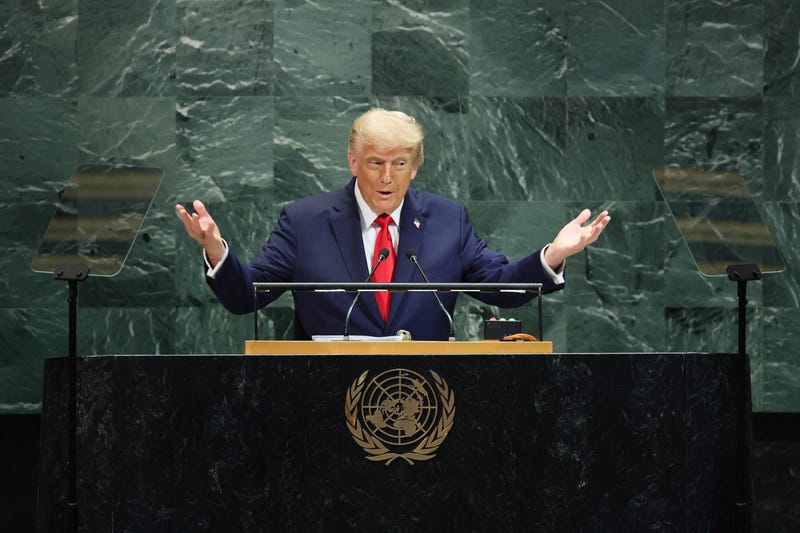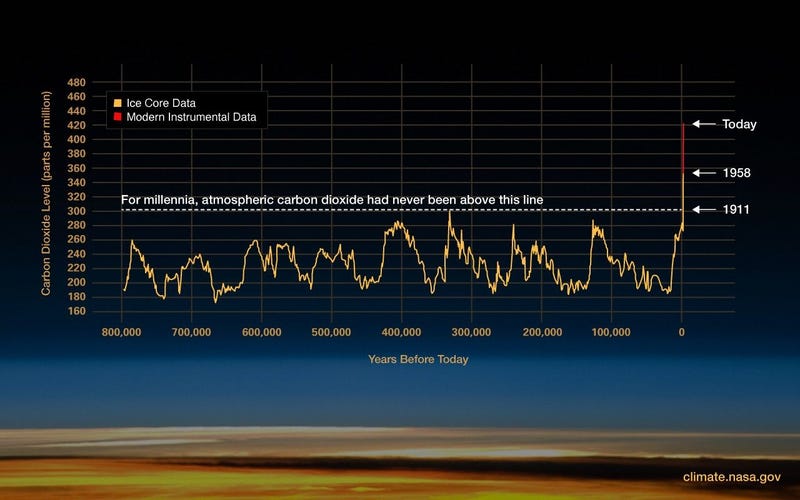Climate stories have made big national news twice this week, with President Donald Trump calling it a "hoax" during his speech at the U.N. on Tuesday, and news on Wednesday from China - the world’s largest carbon polluting nation - announcing a new climate fighting goal to cut emissions by 7% to 10% by 2035.
It once again sparks a conversation on how much of an effect humans have over the climate, and what is being done both in the U.S. and globally to reduce how much carbon we're putting into the atmosphere.
Dr. Abraham is a professor of thermal sciences at the University of St. Thomas and talked to WCCO's Adam and Jordana on Thursday, saying not only is climate change real, it is accelerating.
"We know it's happening, whether you're a farmer in southwest Minnesota or you're living in the middle of Minneapolis like I do," says Abraham. "We see climate change around us and we see how it's affecting our pocketbooks and our lives, we see how it affects insurance rates, and how it affects the productivity of farm fields. So, climate change is an issue and it's affecting our lives."
Still, from the president down to your neighbors, family members, and the millions of people who dismiss how much humans affect it? Abraham said that is well beyond established science now.
"We have our hands on the dial of the climate. Humans are the dominant factor behind climate change," he said. "Now, there is climate and there is climate variability whether humans are here or not. You have weather, things go up and down, things change all the time. But what we're seeing now is unnatural. We're seeing climate changes that we have not seen on planet Earth for well over a million years."
According to NASA, which tracks evidence of changes in the climate using Earth-orbiting satellites and new technologies, says the evidence is clear, and happening at rates not seen in thousands - many, many thousands - of years.
"The current warming trend is different because it is clearly the result of human activities since the mid-1800s, and is proceeding at a rate not seen over many recent millennia," NASA writes. "It is undeniable that human activities have produced the atmospheric gases that have trapped more of the Sun’s energy in the Earth system. This extra energy has warmed the atmosphere, ocean, and land, and widespread and rapid changes in the atmosphere, ocean, cryosphere, and biosphere have occurred."
Energy concerns are legitimate - and solvable
Abraham said those that are dismissive about the effects and economic issues surrounding climate change have legitimate concerns. Nobody wants to see the cost of energy rising. But, he says there is still a clear path forward, and unlike 25, 30 or more years ago, the cost of renewables is at a point where it makes economic sense to use.
"Do I really want to pay 50% more for my electricity to save some polar bears that I'm never even gonna see? And, for that dismissive crowd, I just want them to know that they have legit concerns about how do we transform our world to bring energy costs down and save the climate at the same time," Abraham adds. "There is a pathway forward. We can do it if we work together."
A concern President Trump consistently voices, and one that come through loud and clear anytime there is a debate about climate: why would the U.S. restrict ourselves to a certain set of rules that other countries aren't playing by? And China - the largest polluting nation just ahead of the United States and India - is always the target.
At the United Nations' high-level climate summit this week, Chinese president Xi Jinping announced the world’s largest carbon-polluting country would aim to cut emissions by 7% to 10% by 2035. China produces more than 31% of the world's carbon dioxide emissions, and they have long been soaring.
In a video address, Xi pledged that China would increase its wind and solar power sixfold from 2020 levels, make pollution-free vehicles mainstream and “basically establish a climate adaptive society.”
Abraham adds that China produces significant amounts of carbon and needed to do something about it, but that doesn't absolve the U.S. from doing more, and he says that much of what China produces comes specifically from U.S. needs.
"The U.S. and industrialized nations, especially Europe, we became rich on cheap energy," he says. "We became rich on coal and fossil fuels. And now for us to go around and say to India and to China and to Indonesia and to other developing countries, 'hey, you can't get rich like we did, you don't have this easy pathway forward to prosperity.' That's a tough pill for them to swallow."

Trump's climate comments challenged
Xi and Brazil’s leader also made statements on Wednesday afternoon that may have referred to U.S. President Donald Trump’s attacks a day earlier on renewable energy and the concept of climate change. “While some countries are acting against it, the international community should stay focused on the right direction," Xi said.
Brazilian President Luiz Inácio Lula da Silva, who is hosting the upcoming climate conference, said, "no one is safe from the effect of climate change. Walls at borders will not stop droughts or storms,” Lula said. “Nature does not bow down to bombs or warships. No country stands above another.”
Said Guterres: “The science demands action. The law commands it. The economics compel it. And people are calling for it.”
Abraham notes that there are countries worse than others, and even while a country that is producing as much carbon as China is trying to reverse some of that, other countries are sabotaging climate efforts.
"Saudi Arabia and the USA are two of the countries that are mostly sabotaging the climate agreements, because of their own company, country interests," Abraham said. "But I think there's a way where we can all work together for a better common future, where we all thrive, and it just takes a lot of courage to articulate that."
"China is this country that went from developing to a major superpower, and in part based on manufacturing that we actually exported to China," Dr. Abraham tells WCCO. "So we had these factories in the U.S. and we brought those factories to China because people worked cheaper. And then we reimported goods that those factories made. So in a certain sense, we exported our pollution problem."
Abraham says despite that, the U.S. , China and India can't be ignored for their contributions to climate change.
"We can't ignore any country that's contributing to the climate change problem," he says.
‘Here we must admit failure’
“Warming appears to be accelerating,” climate scientist Johan Rockstrom said in a science briefing that started the summit. “Here we must admit failure. Failure to protect peoples and nations from unmanageable impacts of human-induced climate change.”
“We’re dangerously close to triggering fundamental and irreversible change,” Rockstrom said.
Texas Tech climate scientist Katharine Hayhoe told leaders that every tenth of a degree of warming is connected to worsening floods, wildfires, heat waves, storms and many more deaths: “What’s at stake is nothing less than everything and everyone we love.”
In a news conference, Lula said he invited both Trump and Xi to the November climate negotiations, saying it’s important that leaders listen to scientists.
Under the 2015 Paris climate accord, 195 nations are supposed to submit new more stringent five-year plans on how to curb carbon emissions from the burning of coal, oil and natural gas.
U.N. officials said countries really need to get their plans in by the end of the month so the U.N. can calculate how much more warming Earth is on track for if nations do what they promise. Former U.S. President Joe Biden submitted America's plan late last year before leaving office and the Trump administration has distanced itself from the plan.
Before 2015, the world was on path for 4 degrees Celsius (7.2 degrees Fahrenheit) of warming since pre-industrial times, but now has trimmed that to 2.6 degrees Celsius (4.7 degrees Fahrenheit), Guterres said.
However, the Paris accord set a goal of limiting warming to 1.5 degrees Celsius (2.7 degrees Fahrenheit) since the mid 19th century and the world has already warmed about 1.3 degrees Celsius (2.3 degrees Fahrenheit) since.
Simon Stiell, UN's climate chief, said the Chinese plan "is a clear signal that the future global economy will run on clean energy. And that for every country, stronger and faster climate action means more economic growth, jobs, affordable and secure energy, cleaner air, and better health, for all of us, everywhere.”
Lula also praised China's announcement, but some advocates were underwhelmed, but they said China has reputation for under-promising and over-delivering on climate action.
“China’s latest climate target is too timid given the country’s extraordinary record on clean energy," said former Colombia President Juan Manuel Santos, chair of the group The Elders. "China must go further and faster”

